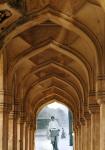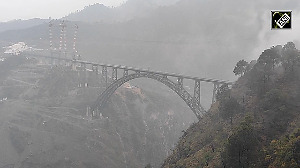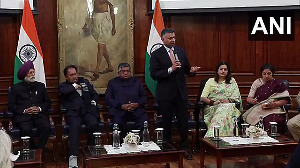Indians have emerged as the leading source of imported intellectual capital for the United States, with a growing number of students enrolling in American universities even as overall foreign enrolment dropped, according to a media report.
The good news comes from India whose students were overtaking their Chinese counterparts as the largest group of foreign students enrolled in US universities, the San Jose Mercury News reported, adding their numbers continued to rise.
In 2003-04, the number of foreign students from India rose to 79,736 compared with 61,765 from China, the report said.
At Stanford University, the number of students from India had risen to 461 in the current academic year, up 23 per cent from two years ago, while the number of Chinese students slipped to 545 from 553. At San Jose State University, Indian student numbers grew 21 per cent over the past two years to 254, while the population of Chinese students shrank by 35 per cent to 68.
However, some quarters in the United States have expressed concern over the overall decline of foreign enrolments in the country's universities.
Silicon Valley, which has welcomed foreign students to fill the jobs and help the US maintain its technical edge in the world, was concerned that the declining number of foreign students could jeopardise an important source of brainpower.
The total number of foreign students dropped by 2.4 per cent in the 2003-04 academic year. "We could lose some of the extremely talented people who have come here and contributed," said Arthur Bienenstock, Vice-Provost and Dean of graduate research at Stanford.
The significance of foreign students was underscored by a University of California in Berkeley study which found that in 1998, Chinese and Indian computer scientists and engineers operated 25 per cent of high-tech firms in the San Francisco Bay region -- and accounted for more than 58,000 jobs and almost $17 billion in sales.
According to the report, much change in mix appeared to be related to tougher screening of visa applicants after the Sept. 11, 2001 terrorist attack and the differing ways they were handled at embassies and consulates abroad.
Security check on visa applications from students in science and technology fields is believed to have discouraged many Chinese students from applying to US schools. Not so for Indian students, who faced the same screening and whose enrolment shot up by 46 per cent from the 2000-01 academic year to 2003-04. Chinese enrolment rose three per cent during that time.
"I expect their (Indian) numbers to continue to grow," said Peggy Bloomenthal, vice president for educational programmes at the Institute of International Education in New York. "Indian students haven't experienced problems with security checks to the same degree as the Chinese because the processing has gone a lot smoother at the US Embassy in New Delhi. They took measures to shorten the delays at an earlier stage, she was quoted as saying.




